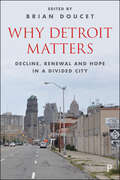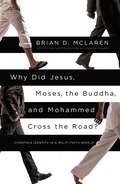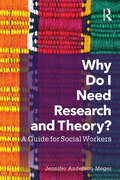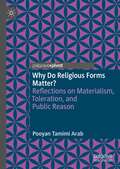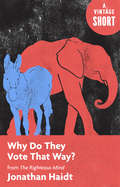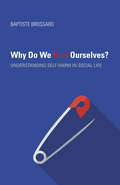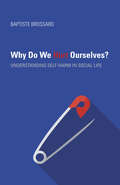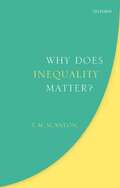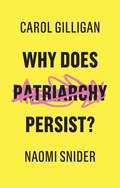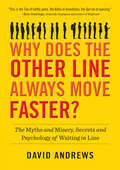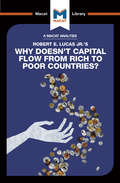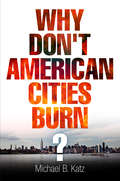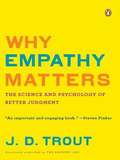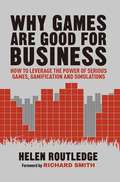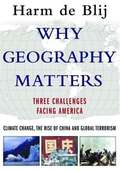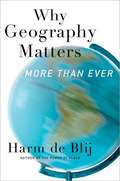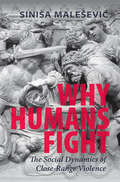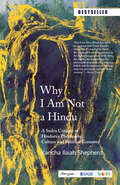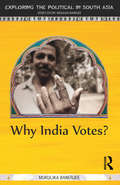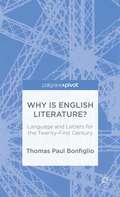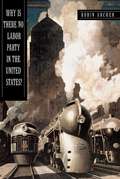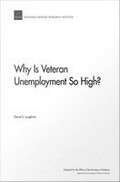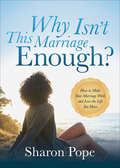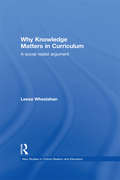- Table View
- List View
Why Detroit Matters: Decline, Renewal and Hope in a Divided City
by Brian DoucetDetroit has come to symbolise deindustrialization and the challenges, and opportunities, it presents. As many cities struggle with urban decline, racial and ethnic tensions and the consequences of neoliberal governance and political fragmentation, Detroit’s relevance grows stronger. Why Detroit Matters bridges academic and non-academic responses to this extreme example of a fractured and divided, post-industrial city. Contributions from many of the leading scholars on Detroit are joined by influential writers, planners, artists and activists who have contributed chapters drawing on their experiences and ideas. The book concludes with interviews with some of the city’s most important visionaries who are engaged in inspiring practices which provide powerful lessons for Detroit and other cities around the world. The book will be a valuable reference for scholars, practitioners and students from across disciplines including geography, planning, architecture, sociology, urban studies, history, American studies, and economics.
Why Did Jesus, Moses, the Buddha, and Mohammed Cross the Road?: Christian Identity in a Multi-Faith World
by Brian D. MclarenWhen four religious leaders walk across the road, it's not the beginning of a joke. It's the start of one of the most important conversations in today's world. Can you be a committed Christian without having to condemn or convert people of other faiths? Is it possible to affirm other religious traditions without watering down your own? In his most important book yet, widely acclaimed author and speaker Brian McLaren proposes a new faith alternative, one built on "benevolence and solidarity rather than rivalry and hostility." This way of being Christian is strong but doesn't strong-arm anyone, going beyond mere tolerance to vigorous hospitality toward, interest in, and collaboration with the other. Blending history, narrative, and brilliant insight, McLaren shows readers step-by-step how to reclaim this strong-benevolent faith, challenging us to stop creating barriers in the name of God and learn how affirming other religions can strengthen our commitment to our own. And in doing so, he invites Christians to become more Christ-like than ever before.
Why Do I Need Research and Theory?: A Guide for Social Workers
by Jennifer Anderson-MegerThis book is based on the idea that social work as a profession can do better with advancing our mission if practitioners are knowledgeable, skilled, critical thinkers that use research to inform practice. This is a user-friendly, student directed book form to help students understand the connection between knowledge, social work research, and social work practice. This short text will support students in their research course by offering insights as to why research is important, how to help students understand how research affects their own future social work practice, how their beliefs impact successful learning, and practical tips for being successful in research.
Why Do Religious Forms Matter?: Reflections on Materialism, Toleration, and Public Reason
by Pooyan Tamimi ArabIn Why Do Religious Forms Matter?, Pooyan Tamimi Arab reflects on the Early Modern roots and contemporary relevance of a materialist perspective on the politics of religious diversity.Taking as a starting point the insight that religions manifest in myriad sensible forms—in architecture, in images, in the use of objects in rituals, and in distinctive ways of speaking—Tamimi Arab traces to Spinoza the material-religion approach prevalent in anthropology and religious studies. It is in Locke’s political philosophy, however, that forms are tied to toleration—understood as a neutrally applied civil right—which Tamimi Arab discusses through contemporary case studies of mosque construction, amplified calls to prayer, and the right to ritual slaughter.Going beyond the Enlightenment criticism and toleration of religions, the book concludes with an inclusive reading of Rawls’s ideal of public reason, which assumes forms of discourse—religious and non-religious—to always be several. Religious forms thus turn out to be indispensable to liberal democracy itself.
Why Do They Vote That Way?: from The Righteous Mind (A Vintage Short)
by Jonathan HaidtTo understand what drives the rift that divides our populace between liberal and conservative, social psychologist Jonathan Haidt has spent twenty-five year examining the moral foundations that undergird and inform two differing world views: the political left and right place different values of importance on order, care, fairness, loyalty, authority, and liberty. From one of our keenest dissectors of moral systems, Why Do They Vote That Way? explains how deeply ingrained moral systems have estranged conservatives and liberals from one another while crossing the political divide in a search for understanding the miracle of human cooperation. A Vintage Shorts Selection. An ebook short.
Why Do We Hurt Ourselves?: Understanding Self-Harm in Social Life
by Baptiste BrossardWhy does an estimated 5% of the general population intentionally and repeatedly hurt themselves? What are the reasons certain people resort to self-injury as a way to manage their daily lives? In Why Do We Hurt Ourselves, sociologist Baptiste Brossard draws on a five-year survey of self-injurers and suggests that the answers can be traced to social, more than personal, causes. Self-injury is not a matter of disturbed individuals resorting to hurting themselves in the face of individual weaknesses and difficulties. Rather, self-injury is the reaction of individuals to the tensions that compose, day after day, the tumultuousness of their social life and position. Self-harm is a practice that people use to self-control and maintain order—to calm down, or to avoid "going haywire" or "breaking everything." More broadly, through this research Brossard works to develop a perspective on the contemporary social world at large, exploring quests for self-control in modern Western societies.
Why Do We Hurt Ourselves?: Understanding Self-Harm in Social Life
by Baptiste BrossardA sociological analysis of self-injury, the causes of it, and the conditions surrounding those who commit it.Why does an estimated 5% of the general population intentionally and repeatedly hurt themselves? What are the reasons certain people resort to self-injury as a way to manage their daily lives? In Why Do We Hurt Ourselves, sociologist Baptiste Brossard draws on a five-year survey of self-injurers and suggests that the answers can be traced to social, more than personal, causes. Self-injury is not a matter of disturbed individuals resorting to hurting themselves in the face of individual weaknesses and difficulties. Rather, self-injury is the reaction of individuals to the tensions that compose, day after day, the tumultuousness of their social life and position. Self-harm is a practice that people use to self-control and maintain order—to calm down, or to avoid “going haywire” or “breaking everything.” More broadly, through this research Brossard works to develop a perspective on the contemporary social world at large, exploring quests for self-control in modern Western societies.
Why Does Inequality Matter?
by T. M. ScanlonInequality is widely regarded as morally objectionable: The author investigates why it matters to us. Demands for greater equality can seem puzzling, because it can be unclear what reason people have for objecting to the difference between what they have and what others have, as opposed simply to wanting to be better off. This book examines six such reasons. <p><p> Inequality can be objectionable because it arises from a failure of some agent to give equal concern to the interests of different parties to whom it is obligated to provide some good. It can be objectionable because it involves or gives rise to objectionable inequalities in status. It can be objectionable because it gives the rich unacceptable forms of control over the lives of those who have less. It can be objectionable because it interferes with the procedural fairness of economic institutions, or because it deprives some people of substantive opportunity to take part in those institutions. Inequality can be objectionable because it interferes with the fairness of political institutions. Finally, inequality in wealth and income can be objectionable because it is unfair: the institutional mechanisms that produce it cannot be justified in the relevant way. <p><p> Author's aim is to provide a moral anatomy of these six reasons, and the ideas of equality that they involve. He also examines objections to the pursuit of equality on the ground that it involves objectionable interference with individual liberty, and argues that ideas of desert do not provide a basis either for justifying significant economic inequality or for objecting to it.
Why Does Patriarchy Persist?
by Carol Gilligan Naomi SniderThe election of an unabashedly patriarchal man as US President was a shock for many—despite decades of activism on gender inequalities and equal rights, how could it come to this? What is it about patriarchy that seems to make it so resilient and resistant to change? Undoubtedly it endures in part because some people benefit from the unequal advantages it confers. But is that enough to explain its stubborn persistence? In this highly original and persuasively argued book, Carol Gilligan and Naomi Snider put forward a different view: they argue that patriarchy persists because it serves a psychological function. By requiring us to sacrifice love for the sake of hierarchy, patriarchy protects us from the vulnerability of loving and becomes a defense against loss. Uncovering the powerful psychological mechanisms that underpin patriarchy, the authors show how forces beyond our awareness may be driving a politics that otherwise seems inexplicable.
Why Does the Other Line Always Move Faster?: The Myths and Misery, Secrets and Psychology of Waiting in Line
by David AndrewsHow we wait, why we wait, what we wait for—waiting in line is a daily indignity that we all experience, usually with a little anxiety thrown in (why is it that the other line always moves faster?!?). This smart, quirky, wide-ranging book (the perfect conversation starter) considers the surprising science and psychology—and the sheer misery—of the well-ordered line. On the way, it takes us from boot camp (where the first lesson is to teach recruits how to stand rigidly in line) to the underground bunker beneath Disneyland’s Cinderella Castle (home of the world’s most advanced, state-of-the-art queue management technologies); from the 2011 riots in London (where rioters were observed patiently taking their turns when looting shops), to the National Voluntary Wait-in-Line days in the People’s Republic of China (to help train their non-queuing populace to wait in line like Westerners in advance of the 2008 Olympics). Citing sources ranging from Harvard Business School professors to Seinfeld, the book comes back to one underlying truth: it’s not about the time you spend waiting, but how the circumstances of the wait affect your perception of time. In other words, the other line always moves faster because you’re not in it.
Why Doesn't Capital Flow from Rich to Poor Countries?
by Pádraig BeltonRobert Lucas is known among economists as one of the most influential macroeconomists of recent times – a reputation founded in no small part on the critical thinking skills displayed in his seminal 1990 paper ‘Why Doesn’t Capital Flow from Rich to Poor Countries?’ Lucas’s paper tackles a puzzle in economic theory that has since come to be known as the ‘Lucas paradox,’ and it deploys the author’s brilliant problem solving skills to explain why such an apparent paradox in fact makes sense. Classical economic theory makes a simple prediction of how capital flows between countries: it should, it states, flow from rich to poor countries, because of the law of diminishing returns on capital. Since poor countries have so little capital invested in them, the returns on new investment should be proportionally far better than investment in rich countries. This should mean that investors seeking new opportunities will invest in poorer countries, making capital consistently flow from rich nations to poorer ones. But, problematically, this is not in fact the case. Having defined the problem, Lucas did what any good problem solver would: he looked critically at the criteria involved, and offered a series of possible solutions. Indeed, in just six pages, he puts forward four hypotheses to explain the paradox’s existence. The popularity of his paper, and the influence it has had, are also greatly magnified by careful reasoning embodied in Lucas’s marshalling of evidence and his explanations of the judgements he has made.
Why Don't American Cities Burn?
by Michael B. KatzAt 1:27 on the morning of August 4, 2005, Herbert Manes fatally stabbed Robert Monroe, known as Shorty, in a dispute over five dollars. It was a horrific yet mundane incident for the poor, heavily African American neighborhood of North Philadelphia--one of seven homicides to occur in the city that day and yet not make the major newspapers. For Michael B. Katz, an urban historian and a juror on the murder trial, the story of Manes and Shorty exemplified the marginalization, social isolation, and indifference that plague American cities.Introduced by the gripping narrative of this murder and its circumstances, Why Don't American Cities Burn? charts the emergence of the urban forms that underlie such events. Katz traces the collision of urban transformation with the rightward-moving social politics of late twentieth- and early twenty-first-century America. He shows how the bifurcation of black social structures produced a new African American inequality and traces the shift from images of a pathological black "underclass" to praise of the entrepreneurial poor who take advantage of new technologies of poverty work to find the beginning of the path to the middle class. He explores the reasons American cities since the early 1970s have remained relatively free of collective violence while black men in bleak inner-city neighborhoods have turned their rage inward on one another rather than on the agents and symbols of a culture and political economy that exclude them.The book ends with a meditation on how the political left and right have come to believe that urban transformation is inevitably one of failure and decline abetted by the response of government to deindustrialization, poverty, and race. How, Katz asks, can we construct a new narrative that acknowledges the dark side of urban history even as it demonstrates the capacity of government to address the problems of cities and their residents? How can we create a politics of modest hope?
Why Empathy Matters
by J. D. TroutA road map to empathic and efficient decisions and policies, constructed from new insights in the science of human judgment Faced with another's suffering, human beings feel sympathy and may even be moved to charity. However, for all our good intentions and vaunted free will, we are lousy at making the bigger decisions that actually improve lives. Why? Drawing on his sweeping and innovative research in the fields of psychology, behavioral economics, and neuroscience, philosopher and cognitive scientist J. D. Trout explains how our empathic wiring actually undermines the best interests of individuals and society. However, it is possible to bridge this "empathy gap" and improve our decision-making. Here, Trout offers a tantalizing proposal- how to vault that gap and improve the lives of not just ourselves but the lives of everyone all around the world. .
Why Games Are Good For Business: How to Leverage the Power of Serious Games, Gamification and Simulations
by Helen RoutledgeBy tapping into the same psychology that keeps gamers glued to Minecraft or World of Warcraft, innovative organizations are creating their own engaging and flexible learning experiences. They're called Serious Games. This is a practical toolkit for those who want to learn about more serious games and how to apply them in the workplace.
Why Geography Matters: Climate Change, The Rise of China, and Global Terrorism
by Harm De BlijDe Blij, a geography professor and former National Geographic Society editor, seeks to rekindle interest in his discipline with this unfocused survey of the world and its discontents. Struggling to describe his notoriously hard-to-define field, de Blij suggests that geographers "look at things spatially" as opposed to "temporally" or "structurally," the "things" being a grab bag of phenomena, including climate, topography, demographics, national boundaries and the distribution of languages, religions, energy deposits and pipelines.
Why Geography Matters: More Than Ever
by Harm De BlijFor anyone trying to understand our complex and dynamic world, this book offers not only a unique trove of concepts and ideas, but links them clearly and directly to world events.
Why Humans Fight Why Humans Fight: The Social Dynamics of Close-Range Violence
by Siniša MaleševićMalešević offers a novel sociological answer to the age-old question: 'Why do humans fight?'. Instead of focusing on the motivations of solitary individuals, he emphasises the centrality of the social and historical contexts that make fighting possible. He argues that fighting is not an individual attribute, but a social phenomenon shaped by one's relationships with other people. Drawing on recent scholarship across a variety of academic disciplines as well as his own interviews with the former combatants, Malešević shows that one's willingness to fight is a contextual phenomenon shaped by specific ideological and organisational logic. This book explores the role biology, psychology, economics, ideology, and coercion play in one's experience of fighting, emphasising the cultural and historical variability of combativeness. By drawing from numerous historical and contemporary examples from all over the world, Malešević demonstrates how social pugnacity is a relational and contextual phenomenon that possesses autonomous features.
Why I Am Not a Hindu: A Sudra Critique of Hindutva Philosophy, Culture and Political Economy
by Kancha Ilaiah Shepherd‘The most gratifying thing for me [is] that [this book] was listed as a millennium book [by The Pioneer] along with Dr. B. R. Ambedkar’s Annihilation of Caste. Moreover, it has been translated into several Indian languages. In a way it has become a weapon in the hands of Dalitbahujan activists’. -from the Afterword to the second edition. Kancha Ilaiah Shepherd writes with passionate anger, laced with sarcasm, on the caste system and Indian society. He looks at the socioeconomic and cultural differences between the Dalitbahujans and Hindus in the contexts of childhood, family life, market relations, power relations, Gods and Goddesses, death and, not the least, Hindutva. Synthesizing many of the ideas of Bahujans, he presents their vision of a more just society. In this second edition, Ilaiah Shepherd presents an Afterword that discusses the history of this book, often seen as the manifesto of the downtrodden Dalitbahujans. He talks of its reviews as well as of the abuse he has received from its detractors. He reminds us of the need for an ongoing dialogue. As he says, he wrote the book ‘for all who have open minds. My request to Brahmin, Baniya and neo-Kshatriyas [upper class Sudras] is this: You learnt only what to teach others—the Dalitbahujans. Now in your own interest and in the interest of this great country, you must learn to listen and to read what we have to say.’
Why India Votes? (Exploring the Political in South Asia)
by Mukulika BanerjeeWhy India Votes? offers a fascinating account of the Indian electorate through a series of comprehensive ethnographic explorations conducted across the country — Delhi, Uttar Pradesh, Bihar, West Bengal, Chhattisgarh, Madhya Pradesh, Tamil Nadu, Kerala, Maharashtra, Gujarat, and Rajasthan. It probes the motivations of ordinary voters, what they think about politicians, the electoral process, democracy and their own role within it. This book will be useful to scholars and students of political science, anthropology and sociology, those in media and politics, and those interested in elections and democracy as also the informed general reader.
Why Inequality Matters
by Shlomi SegallEquality is a key concept in our moral and political vocabulary. There is wide agreement on its instrumental value and its favourable impact on many aspects of society, but less certainty over whether it has a non-instrumental or intrinsic value that can be demonstrated. In this project, Shlomi Segall explores and defends the view that it does. He argues that the value of equality is not reducible to a concern we might have for the worse off, or to ensuring that individuals do not fall into poverty and destitution; instead he claims that undeserved inequalities, wherever and whenever we might find them, are bad in themselves. Assessing the strength of competing accounts, such as sufficientarianism and prioritarianism, he brings together for the first time discussions of the moral value of equality with luck- or responsibility-sensitive accounts of distributive justice. His book will interest readers in political and moral philosophy.
Why Is English Literature?
by Thomas Paul BonfiglioWhy is English synonymous with literature in the United States? Bonfiglio contextualizes the rising hegemony of English within the anti-labor, anti-immigration, xenophobic, mercantile, militarist, and technocratic ideologies that arose in the US in the first half of twentieth century.
Why Is There No Labor Party In The United States? (Princeton Studies In American Politics)
by Robin ArcherWhy is the United States the only advanced capitalist country with no labor party? This question is one of the great enduring puzzles of American political development, and it lies at the heart of a fundamental debate about the nature of American society. Tackling this debate head-on, Robin Archer puts forward a new explanation for why there is no American labor party--an explanation that suggests that much of the conventional wisdom about "American exceptionalism" is untenable. Conventional explanations rely on comparison with Europe. Archer challenges these explanations by comparing the United States with its most similar New World counterpart--Australia. This comparison is particularly revealing, not only because the United States and Australia share many fundamental historical, political, and social characteristics, but also because Australian unions established a labor party in the late nineteenth century, just when American unions, against a common backdrop of industrial defeat and depression, came closest to doing something similar. Archer examines each of the factors that could help explain the American outcome, and his systematic comparison yields unexpected conclusions. He argues that prosperity, democracy, liberalism, and racial hostility often promoted the very changes they are said to have obstructed. And he shows that it was not these characteristics that left the United States without a labor party, but, rather, the powerful impact of repression, religion, and political sectarianism.
Why Is Veteran Unemployment So High?
by David S. LoughranAccording to official statistics, the unemployment rate of young military veterans ages 18-24 reached 29 percent in 2011. This report seeks to put that statistic in perspective by examining the historical time-series of veteran unemployment, comparing the veteran unemployment rate to that of non-veterans, and examining how veteran unemployment varies with time since military separation. Between 2000 and 2011, younger veterans were, on average, 3.4 percentage points more likely to be unemployed than similarly situated younger non-veterans. However, this difference between veteran and non-veteran unemployment falls rapidly with age and time since military separation. The report concludes that the best available evidence supports the hypothesis that relatively high rates of veteran unemployment reflect the fact that veterans, especially younger veterans, are more likely to have recently separated from a job — namely, military service — and, consequently, are more likely to be engaged in job search, which takes time, especially during periods of slow economic growth. The available evidence lends little support to the hypothesis that veterans are inherently disadvantaged in the civilian labor market. Limiting unemployment benefits available to recently separated veterans would likely reduce the length of unemployment spells, but the net effect of such a policy action on the long-term federal budget is unclear. There is very limited evidence on the effectiveness of other federal policies aimed at facilitating the transition of veterans into the civilian labor market.
Why Isn't This Marriage Enough?: How to Make Your Marriage Work and Love the Life You Have
by Sharon PopeThe fifth book in the Soulful Truth Telling series, Why Isn’t This Marriage Enough? is for the woman who has everything she’s ever wanted: the nice husband, the healthy kids, the big home, even the career of her choosing. They have enough money, take family vacations and their kids are in a good school and thriving in their extra-curricular activities. From anyone else’s perspective, her life looks enviable. So why isn’t this enough? She married for safety and security. She married the good guy who wouldn’t hurt her. She plays the role of super-mom, because she can and because she can’t seem to say no to anyone, but her husband. But after long days of caring for everyone else, connecting with her husband in any meaningful way feels like a chore, like he’s one more person that needs something from her. She has love for her husband, the father of her children, but she fears she’s fallen out of love with him. She chose this path, this marriage, this life – so why does she feel so empty and alone? If this isn’t enough, will it ever be enough? What would it take to feel happy? Is that even possible? What kind of miracle is needed for this – all of this – to feel good?Why Isn’t This Marriage Enough guides women to find the answers to that important question and explores whether the marriage can be transformed into a relationship that feels like more than enough.
Why Knowledge Matters in Curriculum: A Social Realist Argument (New Studies in Critical Realism and Education (Routledge Critical Realism))
by Leesa WheelahanWhat should we teach in our schools and vocational education and higher education institutions? Is theoretical knowledge still important? This book argues that providing students with access to knowledge should be the raison d’être of education. Its premise is that access to knowledge is an issue of social justice because society uses it to conduct its debates and controversies. Theoretical knowledge is increasingly marginalised in curriculum in all sectors of education, particularly in competency-based training which is the dominant curriculum model in vocational education in many countries. This book uses competency-based training to explore the negative consequences that arise when knowledge is displaced in curriculum in favour of a focus on workplace relevance. The book takes a unique approach by using the sociology of Basil Bernstein and the philosophy of critical realism as complementary modes of theorising to extend and develop social realist arguments about the role of knowledge in curriculum. Both approaches are increasingly influential in education and the social sciences and the book will be helpful for those seeking an accessible introduction to these complex subjects. Why Knowledge Matters in Curriculum is a key reading for those interested in the sociology of education, curriculum studies, work-based learning, vocational education, higher education, adult and community education, tertiary education policy and lifelong learning more broadly.
